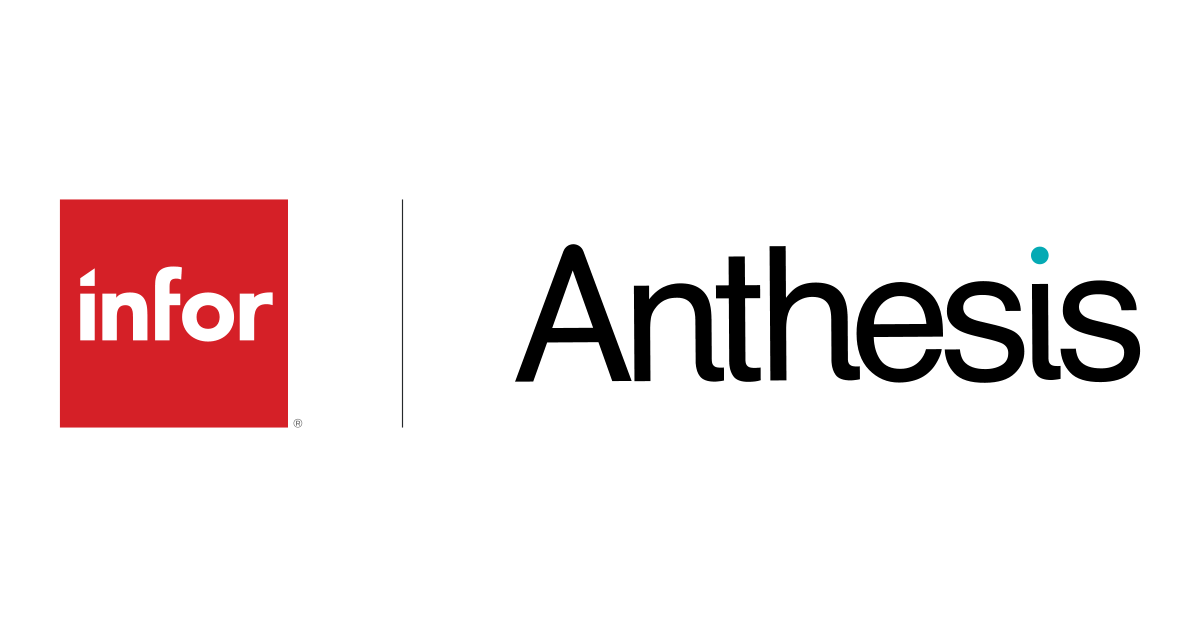Anthesis serves up exciting news by officially becoming an Infor Alliance Partner.
This move represents the next step in our Infor partnership journey, and our commitment to deliver an outstanding service to our customers. As an Alliance Partner, Anthesis will co-sell with Infor to complement and provide services for the Infor portfolio of solutions, primarily focused on the Food & Beverage and Distribution sectors where Anthesis already holds a strong reputation.
Neal Abdool, Infor Alliances Manager UKI states “Anthesis has supported us greatly as a delivery and channel partner, we are excited to extend this partnership to further cement them within our ecosystem. Infor welcomes Anthesis with open arms as an Alliance Partner to help us expand our delivery capabilities.”
Established in 2009, Anthesis Ltd is a UK based company specialising in ERP software and services to customers in over 25 countries. As an Infor UK Gold Channel and Alliance Partner, Anthesis sells, implements, and supports ERP software. With a team of more than 150 experts providing over 20,000 days of technical and functional consultancy each year, Anthesis helps businesses release the value of their Enterprise Applications.
Blazing a trail with perpetual transformation
In fact, a one-off project alone simply isn’t sufficient in delivering the kind of change required to become digitally relevant enough to thrive in modern markets, particularly as they are constant changing. What’s needed to truly adapt and blaze a trail in this new world is the infrastructure, skills, investment and most importantly, vision, to be able to continually transform through an ongoing series of projects. This discipline can be better described as perpetual transformation.
Perpetual transformation is a methodology that recognises the limitations of one-off change management, instead focusing on the ongoing review and refinement of digital capabilities, in the quest for continual performance improvement. Of course, for most companies, this journey will start with a significant project, but the key to success is viewing this as a foundation from which to build, extend and re-shape capabilities.
Inevitably this requires a major culture shift and an adjustment in the way organisations view technology. Contrary to traditional business cases, which typically pointed to automation and efficiency as the primary benefits of new systems, digitalisation has become a facilitator of change, underpinning all important agility to address market volatility, and support new initiatives and business models as demand evolves.
While the likes of Apple and Amazon might be front of mind when considering the best examples of perpetual transformation, more relatable case studies are all around us. Take UPS, which leveraged analytics to bridge a customer service gap to deliver live tracking; Dominos’ pizza tracker, which it launched as a means to get closer to customers; or Spotify, which scaled its platform through fostering a culture which encourages experimentation, efficiency and accountability.
Having implemented major transformation, all of these brands continually evaluate and invest in perpetual transformation to uphold the very principles on which their respective businesses thrive on.
Dialling down the risk
Perpetual transformation also brings with it a lesser risk profile. While large change management projects inevitably come with a certain amount of risk, a more linear, incremental model dials this down considerably. Moving on from this more radical “all or nothing” mentality, particularly in collaboration with an experienced partner, can drive substantial efficiencies when it comes to business case development alone, notwithstanding the bigger business benefits of this highly agile methodology.
Driving cultural change with the right partner
Working with a dedicated partner which has expertise and experience in your industry can go a long way in supporting the kind of culture change necessary for this model. As well as bringing knowledge, expertise and experience of the wider market, the best consulting teams can continually question, test, and provide an objective perspective. A specialist partner will proactively bring creativity and ideas, suggesting solutions and driving new thinking and innovation forward. And unlike a large in-house team, which can command massive overheads, the right partner can provide the necessary flexibility to deliver consultancy when required, projects as set out, and support and maintenance in the interim. Such a flexible approach not only keeps costs down, but it also delivers expertise on tap as it is needed and can scale to support a true perpetual transformation model.
Implementing a transform-evaluate-transform business model
Viewing a single digital transformation project as a catalyst for change, without further provision made for future investment, is bold to say the least. As the pace of industry change accelerates, at worst, companies may well find that they’ve invested heavily in ad hoc technology projects only to find they’re several steps behind the market leader.
Uncertainty, particularly that which comes from external factors, really is the only real constant on the horizon. As such, those who invest in a continuous transform-evaluate-transform lifecycle, will inevitably establish the resilience and foresight to win market share over competitors. Perpetual transformation is the model that smart companies are adopting to secure and support their future.



